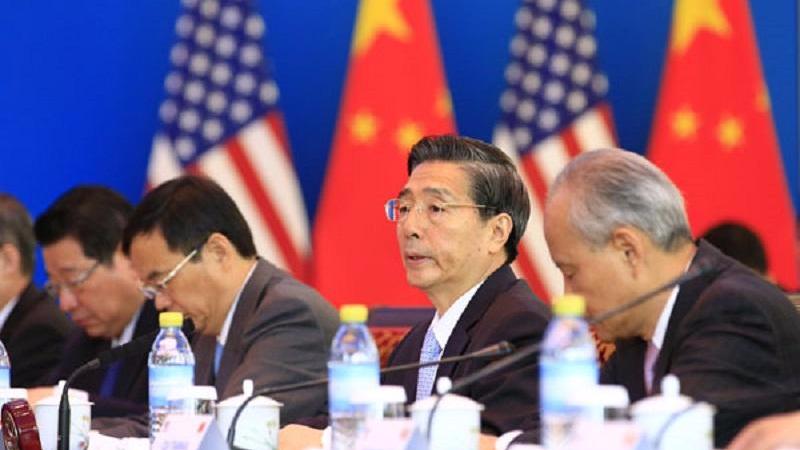Media Report

- Voice Of America reports: "Shilan Zhao, former wife of fugitive Chinese official Jianjun Qiao, pleaded guilty earlier this year to charges by the U.S. government of conspiring to commit immigration fraud related to the EB5 'investor' visa program. Zhao agreed to forfeit millions of dollars' worth of several properties in the United States and to cooperate with the investigation on Qiao, who is wanted by the Chinese government on corruption charges. Qiao escaped to the U.S. with Chinese public funds. But there are other fugitives from China living in the United States, some connected to Beijing's elite, who have so far been outside the reach of Chinese law enforcement. To try to bridge differences, the two countries hold regular dialogues. In recent months, Washington and Beijing have been working to increase cooperation on law enforcement, repatriations, counter-narcotics, counterterrorism and combating cybercrime. On Wednesday, the U.S. and China held a high-level, bilateral Law Enforcement and Cyber Security Dialogue, one of four such meetings agreed to by President Donald Trump and Chinese President Xi Jinping in April. The high-level talks also addressed disagreements between the two countries with frank discussions on immigration and fugitives."
- CNN comments: "Next month, President Donald Trump plans to visit Beijing, a trip that will come amid rising tensions on the Korean Peninsula, persistent trade concerns and a raft of other thorny issues in US-China relations. While the President has sought to build a strong personal relationship with Chinese President and Communist Party General Secretary Xi Jinping -- in part to yield cooperation on North Korean proliferation -- the administration must develop a long-term policy approach that challenges China to abide by its international commitments, adhere to universal standards and embrace the rule of law. Principled American leadership is needed now more than ever. In recent years, the bipartisan Congressional-Executive Commission on China's (CECC) annual reports have found that under President Xi's leadership, China has failed to deliver on long-promised economic reforms and has become more authoritarian domestically. It is also increasingly dismissive of international norms and 'Western' ideas, and more assertive in its extraterritorial reach. The CECC's 2017 Annual Report, which will be released on Thursday, documents even more regression. Although President Xi has stressed the need for global connectivity and openness, domestic censorship leaves little room for journalism and public debate -- just last week the use of WhatsApp, a popular messaging app, was blocked. As stated in the report, China 'continues to strengthen the world's most sophisticated system of internet control and press censorship and forges ahead with what it calls 'internet sovereignty.'"
- Reuters reports: "U.S. business groups expressed frustration on Wednesday with what they said are China's efforts to tilt the economic playing field in favor of domestic companies, adding that World Trade Organization rules are insufficient to police all of Beijing's trade practices. U.S. companies face increasing threats from Chinese investment rules, industrial policies, subsidies to state-owned enterprises, excess manufacturing capacity, cybersecurity regulations and forced technology transfers, the groups told a public hearing held by the U.S. Trade Representative's office. The session will influence an annual report on China's WTO compliance by the U.S. Trade Representative's office as well as a USTR investigation into China's intellectual property practices that could lead to imposition of trade sanctions by President Donald Trump... (Such) concerns are not new. They were highlighted in the USTR's last report to Congress on China's WTO compliance issued on Jan, 1, 2017, and raised in subsequent meetings by Trump administration officials."
Calendar
- 2017-10-04 Ivanka Trump's business in China shrouded in secrecy as public trade data disappears
- 2017-10-03 This week, half of China’s population is on the move
- 2017-10-02 Trump needs China on North Korea but he's doing it wrong: Baucus & Hass
- 2017-09-29 White House conducting wide-ranging review of China policy
- 2017-09-28 China orders North Korean business closed under UN sanctions
- 2017-09-27 Top US Diplomat Tillerson to Travel to China This Week
- 2017-09-26 If This Is a Trade War, China’s Winning
- 2017-09-25 U.S. hopes for 'good deliverables' during Trump's China visit
- 2017-09-24 The nuclear threat can be contained by diplomacy
- 2017-09-20 China finds Trump threats to North Korea unhelpful
News
- Voice Of America High-level US-China Talks Focus on Immigration, Fugitives
- Reuters U.S. business groups say WTO unable to curb many Chinese trade practices
- Newsweek Why Doesn't Trump Care About Human Rights Abuses In China?
- CNN China's tech stocks are partying like it's 1999
- The New York Times A New Zealand Lawmaker's Spy-Linked Past Raises Alarms on China's Reach
- Forbes Why This Asian Property Tycoon Couldn't Care Less About S&P Downgrading China
- Reuters China sees difficulty meeting 2017 air quality targets: minister
- The Diplomat What's in the New China Military Aid to the Philippines?
- Barron's China's Currency: Safer Than Japan's Yen?
- Financial Times Chinese navy visits London in show of power and persuasion
- CNBC Donald Trump is causing the US to fall behind China in tech, economist says
- Quartz Giant pandas in China are fleeing their habitats because of horses and cows
- Financial Times Is Mauritius big enough for China and India?
Commentary
- CNN US should hold China accountable on human rights
- Newsweek U.S. War With China May Be More Likely, Deadlier
- CATO Institute Recognizing the Upside of China's Infrastructure Push
- Forbes China Billionaire's 24-Year-Old Wife Boosts JD.com's Fashion Growth
- Lawfare Understanding China's Crackdown on Bitcoin and ICOs
- Forbes Why The Rest Of Asia Is Worried About China's Big Communist Confab
- CATO Can the Government Destroy Bitcoin?
